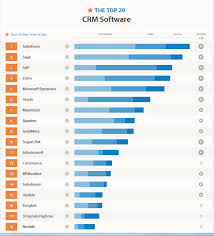Exploring Popular CRM Software Solutions
In today’s fast-paced business world, customer relationship management (CRM) software has become an essential tool for companies looking to streamline their operations and enhance customer interactions. There are several popular CRM software solutions available in the market that cater to the diverse needs of businesses across various industries.
Salesforce
Salesforce is one of the most widely used CRM software platforms, known for its robust features and scalability. It offers a range of tools for sales, marketing, and customer service teams to effectively manage customer relationships and drive business growth. With its cloud-based architecture, Salesforce enables seamless collaboration and access to real-time data from anywhere.
HubSpot CRM
HubSpot CRM is a user-friendly platform that provides businesses with a comprehensive set of tools to manage leads, track interactions, and automate marketing campaigns. It offers integration with other HubSpot products for a seamless inbound marketing experience. HubSpot CRM is known for its intuitive interface and powerful reporting capabilities.
Zoho CRM
Zoho CRM is a versatile solution that caters to businesses of all sizes, offering modules for sales automation, marketing automation, and customer support. It provides customisation options to tailor the system to specific business requirements. Zoho CRM also integrates seamlessly with other Zoho applications for enhanced productivity.
Microsoft Dynamics 365
Microsoft Dynamics 365 is a comprehensive CRM solution that combines sales, marketing, and service functionalities in one platform. It leverages Microsoft’s technology stack to provide businesses with advanced analytics, AI-driven insights, and seamless integration with other Microsoft products like Office 365. Microsoft Dynamics 365 is highly scalable and can be customised to fit specific industry needs.
These are just a few examples of popular CRM software solutions available in the market today. Each platform offers unique features and benefits designed to help businesses improve customer relationships, increase efficiency, and drive revenue growth. When choosing a CRM software solution for your business, it’s essential to consider your specific requirements and objectives to select the best fit for your organisation.
Optimising CRM Software: Five Essential Tips for Enhanced Business Efficiency
- Customise the CRM software to fit your specific business needs and processes.
- Regularly update and maintain your CRM data to ensure accuracy and relevance.
- Train your team members on how to effectively use the CRM software for maximum efficiency.
- Integrate the CRM software with other tools and platforms for seamless workflow automation.
- Utilise reporting and analytics features in the CRM software to gain insights and improve decision-making.
Customise the CRM software to fit your specific business needs and processes.
Customising your CRM software to align with your specific business needs and processes is a crucial step in maximising its effectiveness. By tailoring the software to accommodate your unique workflows and requirements, you can enhance productivity, improve data accuracy, and streamline operations. Customisation allows you to create a system that not only meets your current needs but also adapts to future growth and changes within your organisation. Embracing this tip ensures that your CRM software becomes a powerful tool that fully supports and enhances your business operations.
Regularly update and maintain your CRM data to ensure accuracy and relevance.
Regularly updating and maintaining your CRM data is crucial to ensure its accuracy and relevance. By keeping your customer information current, you can provide personalised experiences, improve communication, and make informed business decisions. Regular data maintenance helps in identifying and rectifying any errors or inconsistencies, ensuring that your CRM remains a reliable source of information for your team. Additionally, up-to-date data enables you to effectively track customer interactions, forecast sales trends, and tailor your marketing strategies for better results. By prioritising data accuracy and relevance in your CRM system, you can enhance overall efficiency and productivity in managing customer relationships.
Train your team members on how to effectively use the CRM software for maximum efficiency.
To maximise the efficiency of popular CRM software solutions, it is crucial to invest in training for your team members. By providing comprehensive training on how to effectively utilise the CRM software, you empower your employees to make the most out of its features and functionalities. Proper training ensures that team members understand how to navigate the system, input data accurately, track customer interactions efficiently, and leverage the software’s capabilities to enhance customer relationships. Equipping your team with the necessary skills and knowledge will not only boost productivity but also drive better results in managing customer relationships and growing your business.
Integrate the CRM software with other tools and platforms for seamless workflow automation.
Integrating your chosen CRM software with other tools and platforms is a valuable tip to enhance workflow automation within your business. By seamlessly connecting your CRM system with other essential applications, such as email marketing tools, project management platforms, or accounting software, you can streamline processes, improve data accuracy, and boost overall productivity. This integration enables smooth data flow between different systems, eliminating the need for manual data entry and ensuring that information is consistently updated across all platforms. Embracing this approach can lead to increased efficiency, better collaboration among teams, and ultimately, enhanced customer experiences.
Utilise reporting and analytics features in the CRM software to gain insights and improve decision-making.
By utilising the reporting and analytics features available in popular CRM software, businesses can gain valuable insights into their customer interactions and performance metrics. These tools enable companies to track key data points, identify trends, and make informed decisions based on real-time information. By leveraging reporting and analytics capabilities, businesses can enhance their strategic planning, improve customer relationships, and ultimately drive growth and success.

